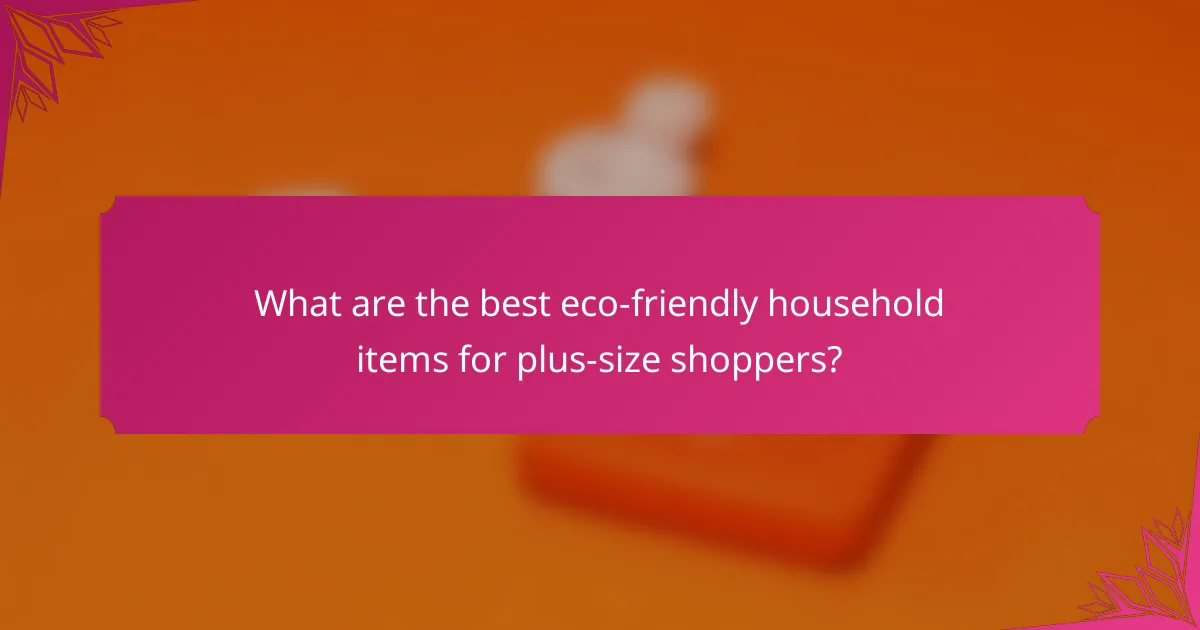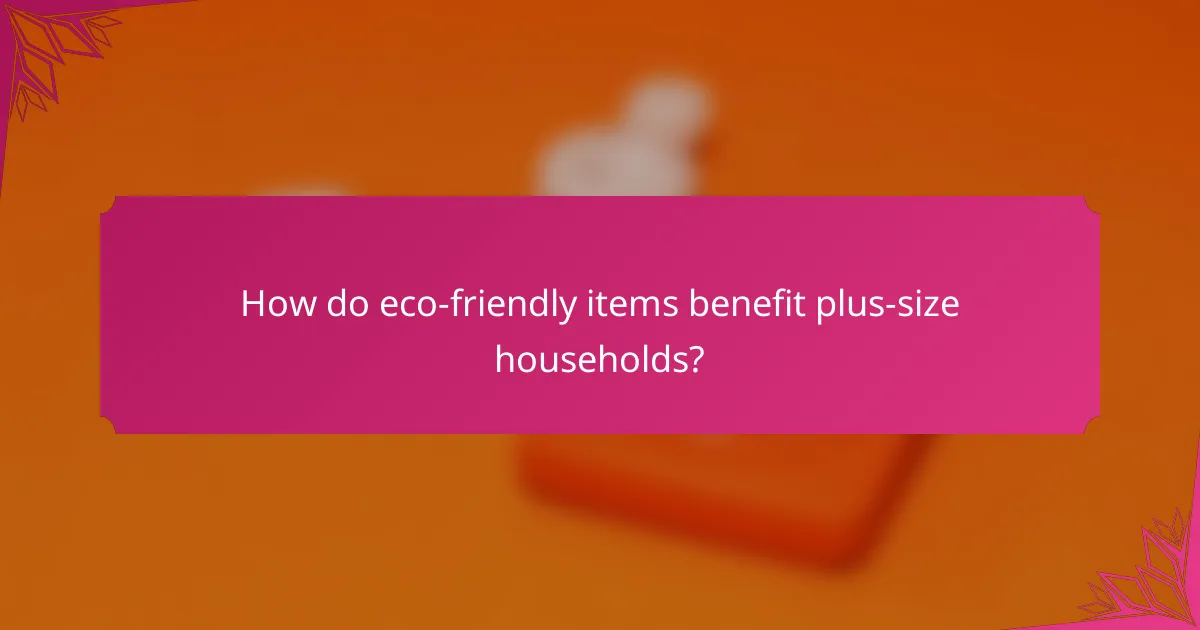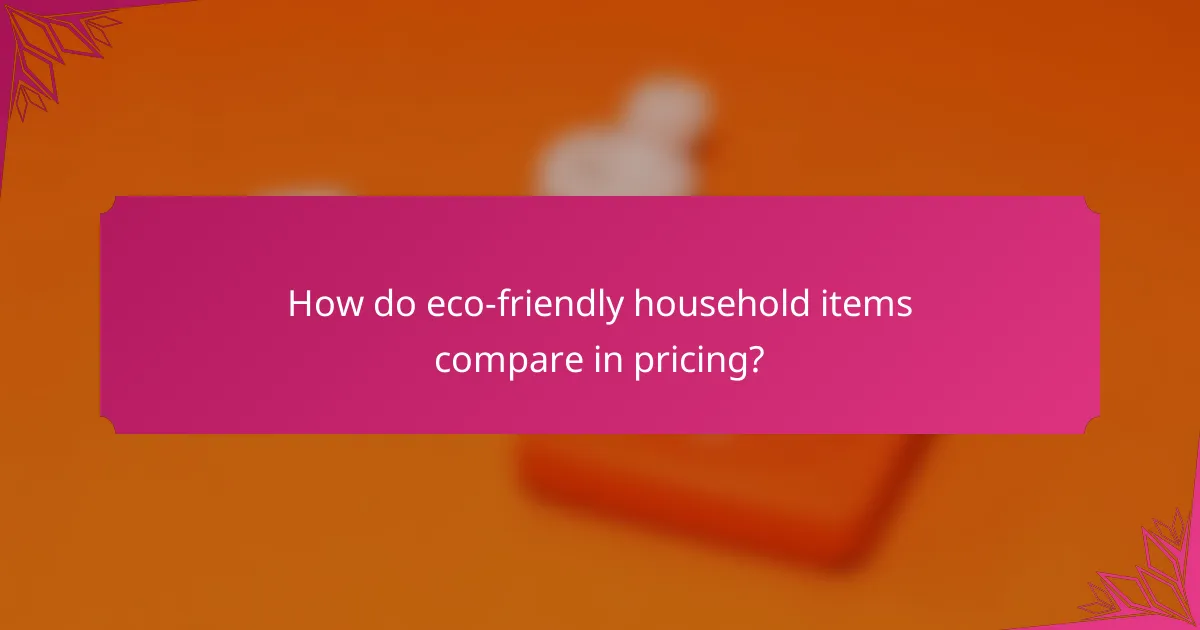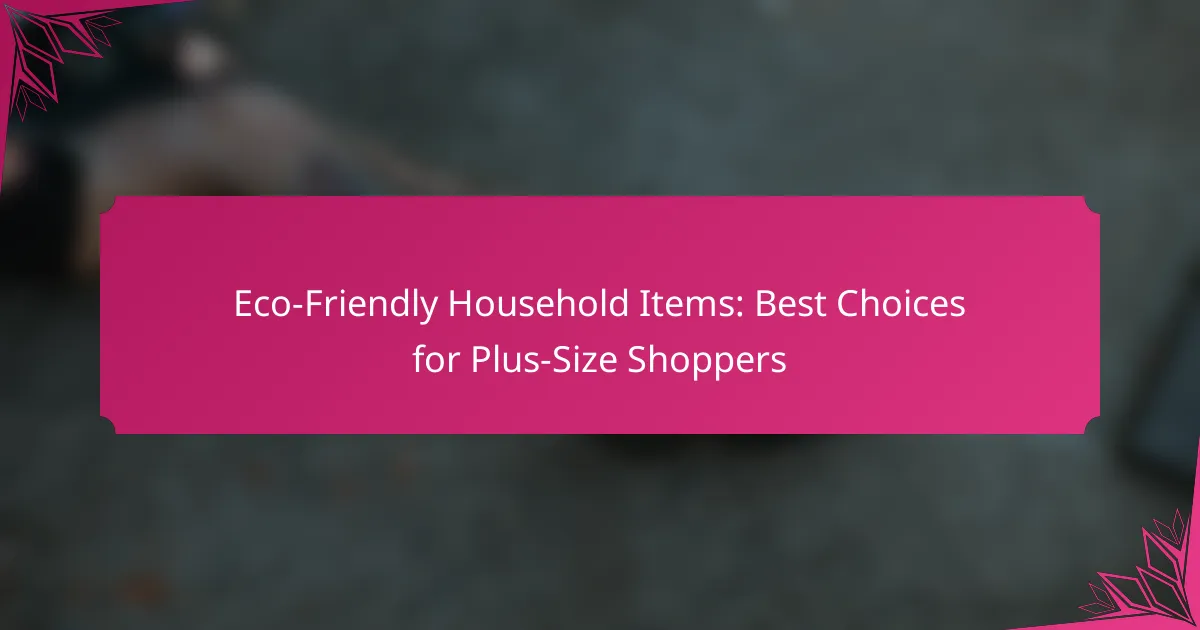Finding the right eco-friendly household items can be a game-changer for plus-size shoppers, combining sustainability with comfort and practicality. These products not only help reduce environmental impact but also cater specifically to the needs of larger individuals, ensuring ease of use and functionality. By choosing eco-friendly options, plus-size households can create a healthier living environment while enjoying long-term cost savings.

What are the best eco-friendly household items for plus-size shoppers?
The best eco-friendly household items for plus-size shoppers focus on sustainability, comfort, and practicality. These products not only minimize environmental impact but also cater to the needs of larger individuals, ensuring both functionality and ease of use.
Biodegradable kitchenware
Biodegradable kitchenware is designed to break down naturally after disposal, reducing landfill waste. Look for items made from materials like bamboo, palm leaves, or cornstarch, which are sturdy yet environmentally friendly.
When selecting biodegradable options, consider their durability and usability. For instance, bamboo plates and utensils can withstand heat and moisture, making them ideal for various cooking and dining situations.
Organic cotton bedding
Organic cotton bedding is a sustainable choice that avoids harmful pesticides and chemicals, promoting a healthier sleeping environment. This type of bedding is soft, breathable, and often more durable than conventional options.
For plus-size shoppers, look for bedding with generous dimensions and deep pockets to ensure comfort and a good fit on larger mattresses. Brands often offer a range of sizes, so check the specifications before purchasing.
Recycled plastic storage solutions
Recycled plastic storage solutions are an eco-friendly way to organize your home while reducing plastic waste. These products are made from post-consumer plastic and come in various shapes and sizes to meet diverse storage needs.
When choosing storage containers, consider their weight capacity and design. Opt for stackable options to maximize space, especially in smaller areas, and ensure they are easy to handle for larger individuals.
Natural fiber cleaning cloths
Natural fiber cleaning cloths, such as those made from cotton, hemp, or linen, are effective and sustainable alternatives to disposable paper towels. These cloths are reusable, washable, and often more absorbent than synthetic options.
For optimal use, select cloths that are durable and easy to clean. A mix of sizes can be beneficial, allowing you to tackle different cleaning tasks efficiently while reducing waste.
Eco-friendly furniture options
Eco-friendly furniture options include pieces made from sustainable materials, such as reclaimed wood or bamboo, which minimize environmental impact. These items are often designed to be durable and stylish, making them suitable for various home aesthetics.
When shopping for furniture, consider the weight capacity and dimensions to ensure they meet your needs. Look for certifications like FSC (Forest Stewardship Council) to confirm sustainable sourcing.

How do eco-friendly items benefit plus-size households?
Eco-friendly items provide significant advantages for plus-size households by promoting a healthier living environment, reducing environmental impact, and offering long-term cost savings. These benefits contribute to overall well-being and sustainability, making them ideal choices for families looking to improve their lifestyle.
Healthier living environment
Using eco-friendly items can lead to a healthier living environment by minimizing exposure to harmful chemicals often found in conventional products. For instance, opting for natural cleaning supplies and organic textiles can reduce allergens and toxins in the home.
Plus-size households may particularly benefit from items designed for comfort and support, such as organic cotton bedding or non-toxic furniture. These products not only enhance well-being but also contribute to better air quality and overall health.
Reduced environmental impact
Eco-friendly items typically have a lower environmental impact due to their sustainable materials and production processes. Choosing products made from recycled or biodegradable materials helps decrease waste and conserves natural resources.
Plus-size households can further reduce their carbon footprint by selecting items that promote energy efficiency, such as LED lighting or energy-efficient appliances. These choices not only benefit the planet but also encourage responsible consumption habits.
Cost savings over time
Investing in eco-friendly items can lead to cost savings over time, as many of these products are designed to be durable and long-lasting. While the initial purchase price may be higher, the longevity of these items often means fewer replacements and lower overall costs.
For example, high-quality reusable bags and containers can replace disposable options, saving money in the long run. Additionally, energy-efficient appliances can lower utility bills, providing further financial benefits for plus-size households committed to sustainability.

Where to buy eco-friendly household items for plus-size shoppers?
Plus-size shoppers can find eco-friendly household items at various retailers that prioritize sustainability and inclusivity. Look for stores that offer a range of products designed to meet the needs of larger individuals while being environmentally conscious.
Amazon eco-friendly section
Amazon features a dedicated eco-friendly section where shoppers can find a variety of sustainable household items. This section includes products made from recycled materials, biodegradable options, and items that promote energy efficiency. Plus-size shoppers can easily filter results based on size and eco-friendly certifications.
When browsing, pay attention to customer reviews and ratings to ensure the quality and suitability of the products. Look for items labeled with certifications such as Energy Star or USDA Organic to guarantee their eco-friendly claims.
Target sustainable products
Target offers a wide selection of sustainable products, including eco-friendly household items specifically designed for plus-size shoppers. Their range includes everything from organic bedding to reusable kitchenware, all made with environmentally friendly materials. Target’s commitment to sustainability is reflected in their private label brands, which often emphasize eco-conscious manufacturing.
Check for seasonal promotions and discounts on sustainable items, as Target frequently runs sales that can help you save money while making eco-friendly choices. Additionally, using the Target app can help you locate products in-store or online that meet your specific needs.
Walmart green living products
Walmart’s green living product line includes a variety of eco-friendly household items suitable for plus-size shoppers. This collection features sustainable cleaning supplies, organic textiles, and energy-efficient appliances. Walmart aims to make green products accessible, often at competitive prices.
When shopping at Walmart, look for their “Great Value” brand, which often includes eco-friendly options. Be sure to compare prices and consider bulk purchasing to maximize savings while supporting sustainable practices.

What criteria should plus-size shoppers consider when choosing eco-friendly items?
Plus-size shoppers should focus on material sustainability, size and capacity, and durability when selecting eco-friendly household items. These criteria ensure that the products not only meet environmental standards but also cater to their specific needs effectively.
Material sustainability
Choosing eco-friendly items starts with understanding the materials used in their production. Look for products made from organic, recycled, or biodegradable materials, as these have a lower environmental impact. For example, bamboo and recycled plastics are often more sustainable options compared to conventional materials.
Additionally, check for certifications like the Global Organic Textile Standard (GOTS) or the Forest Stewardship Council (FSC), which indicate that the materials have been sourced responsibly. This ensures that your purchases support sustainable practices.
Size and capacity
When selecting eco-friendly items, consider their size and capacity to ensure they meet your needs. For instance, larger storage containers or kitchenware may be more practical for plus-size shoppers who require more space for food or belongings. Opt for items that maximize efficiency without compromising on eco-friendliness.
It’s also beneficial to choose multi-functional products that can serve several purposes, reducing the need for multiple items. This not only saves space but also minimizes waste, aligning with eco-friendly principles.
Durability and longevity
Durability is crucial when selecting eco-friendly household items, as longer-lasting products reduce the frequency of replacement and waste. Look for items that are designed to withstand regular use, such as stainless steel cookware or sturdy cleaning tools made from recycled materials.
Investing in high-quality, durable products may have a higher upfront cost but can lead to savings over time. Consider warranties or guarantees that reflect the manufacturer’s confidence in the product’s longevity, ensuring that your eco-friendly choices are also economically sound.

How do eco-friendly household items compare in pricing?
Eco-friendly household items can vary significantly in pricing compared to conventional products, often reflecting their sustainable production methods. While some eco-friendly options may have a higher upfront cost, they can offer long-term savings and benefits for the environment.
Cost of biodegradable products
Biodegradable products typically range from slightly higher to significantly more expensive than their non-biodegradable counterparts. For example, biodegradable trash bags may cost around 10-30% more than standard plastic bags. However, the environmental benefits can outweigh the costs, especially for those committed to reducing waste.
When shopping for biodegradable items, consider bulk purchasing to lower costs. Many retailers offer discounts for larger quantities, which can make these eco-friendly options more affordable.
Price range for organic textiles
Organic textiles, such as bedding and towels, generally fall into a mid to high price range. Expect to pay approximately 20-50% more for organic cotton or bamboo products compared to conventional textiles. This price difference is often due to the sustainable farming practices and certifications involved.
Look for sales or eco-friendly brands that offer competitive pricing without compromising on quality. Investing in organic textiles can lead to better durability and comfort, making them a worthwhile purchase.
Value of recycled materials
Products made from recycled materials can vary widely in price, often depending on the type of material and the manufacturing process. Recycled paper products may be comparable in price to standard options, while items like recycled plastic furniture can be more expensive due to the processing involved.
When considering recycled products, evaluate their durability and lifespan. While the initial cost may be higher, the long-term value can be significant, as these items often last longer and contribute to waste reduction.
